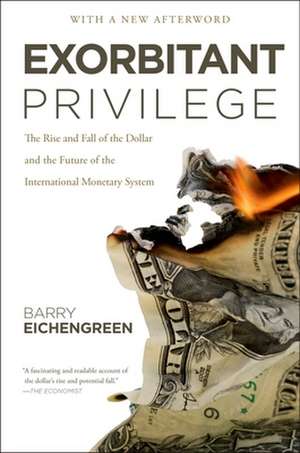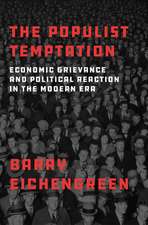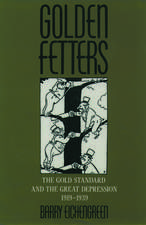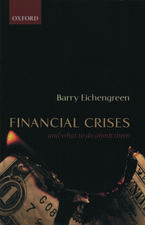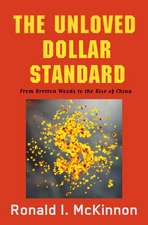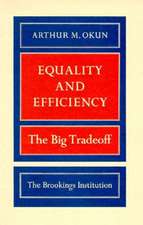Exorbitant Privilege
Autor Barry Eichengreenen Limba Engleză Paperback – 31 aug 2012
| Toate formatele și edițiile | Preț | Express |
|---|---|---|
| Paperback (2) | 64.62 lei 31-38 zile | +24.25 lei 6-12 zile |
| Oxford University Press – 31 aug 2012 | 114.02 lei 3-5 săpt. | |
| Oxford University Press – 27 sep 2012 | 64.62 lei 31-38 zile | +24.25 lei 6-12 zile |
| Hardback (1) | 190.16 lei 31-38 zile | |
| OUP OXFORD – 24 feb 2011 | 190.16 lei 31-38 zile |
Preț: 114.02 lei
Nou
Puncte Express: 171
Preț estimativ în valută:
21.82€ • 22.75$ • 18.13£
21.82€ • 22.75$ • 18.13£
Carte disponibilă
Livrare economică 28 februarie-14 martie
Preluare comenzi: 021 569.72.76
Specificații
ISBN-13: 9780199931095
ISBN-10: 0199931097
Pagini: 226
Dimensiuni: 152 x 231 x 18 mm
Greutate: 0.32 kg
Editura: Oxford University Press
ISBN-10: 0199931097
Pagini: 226
Dimensiuni: 152 x 231 x 18 mm
Greutate: 0.32 kg
Editura: Oxford University Press
Notă biografică
Descriere
Descriere de la o altă ediție sau format:
For more than half a century, the dollar has been not just America's currency but the world's. It is used globally by importers, exporters, investors, governments and central banks alike. This singular role of the dollar is a source of strength for the United States. It is, as a critic of U.S. policies once put it, America's "exorbitant privilege." But now, with U.S. budget deficits extending as far as the eye can see, holding dollars is viewed as a losing proposition. Some say that the dollar may soon cease to be the world's standard currency, which would depress U.S. living standards and weaken the country's international influence. In Exorbitant Privilege, one of our foremost economists, Barry Eichengreen, traces the rise of the dollar to international prominence. He shows how the greenback dominated internationally in the second half of the 20th century for the same reasons that the United States dominated the global economy. But now, with the rise of China, India, Brazil and other emerging economies, America no longer towers over the global economy. It follows, Eichengreen argues, that the dollar will not be as dominant. But this does not mean that coming changes need be sudden and dire DL or that the dollar is doomed to lose its international status. Challenging the presumption that there is room for only one true global currency, Eichengreen shows that several currencies have regularly shared this role. What was true in the distant past will be true, once again, in the not-too-distant future. The dollar will lose its international currency status, Eichengreen warns, only if the United States repeats the mistakes that led to the financial crisis and only if it fails to put its fiscal and financial house in order. Incisive, challenging and iconoclastic, Exorbitant Privilege, is a fascinating analysis of the changes that lie ahead. It is a challenge, equally, to those who warn that the dollar is doomed and to those who regard its continuing dominance as inevitable.
For more than half a century, the dollar has been not just America's currency but the world's. It is used globally by importers, exporters, investors, governments and central banks alike. This singular role of the dollar is a source of strength for the United States. It is, as a critic of U.S. policies once put it, America's "exorbitant privilege." But now, with U.S. budget deficits extending as far as the eye can see, holding dollars is viewed as a losing proposition. Some say that the dollar may soon cease to be the world's standard currency, which would depress U.S. living standards and weaken the country's international influence. In Exorbitant Privilege, one of our foremost economists, Barry Eichengreen, traces the rise of the dollar to international prominence. He shows how the greenback dominated internationally in the second half of the 20th century for the same reasons that the United States dominated the global economy. But now, with the rise of China, India, Brazil and other emerging economies, America no longer towers over the global economy. It follows, Eichengreen argues, that the dollar will not be as dominant. But this does not mean that coming changes need be sudden and dire DL or that the dollar is doomed to lose its international status. Challenging the presumption that there is room for only one true global currency, Eichengreen shows that several currencies have regularly shared this role. What was true in the distant past will be true, once again, in the not-too-distant future. The dollar will lose its international currency status, Eichengreen warns, only if the United States repeats the mistakes that led to the financial crisis and only if it fails to put its fiscal and financial house in order. Incisive, challenging and iconoclastic, Exorbitant Privilege, is a fascinating analysis of the changes that lie ahead. It is a challenge, equally, to those who warn that the dollar is doomed and to those who regard its continuing dominance as inevitable.
Recenzii
A tour de force, by the outstanding contemporary scholar of the 20th century history of the international monetary system.
The great strength of Eichengreen's historical analysis is his enormously wide knowledge of, and sympathy for, economic and political conditions in all the major countries concerned. The work of a master economic historian.
Eichengreen shows an unerring ability to get right to the heart of the matter....He summarises the current debate on financial crises, and then takes it one stage further ... neatly and sensibly argued ... an insightful insider's analysis ... It will bring the reader up to speed on the topic in record time: everything you need to know is tidily and concisely expressed in this refreshingly accessible book, which caters for the practitioner and the novice alike.
Incredibly relevant work
Short and eminently readable...In just 177 pages of text, [Eichengreen] provides a wealth of material for both the lay reader and the scholar...You can't do better than Eichengreen for a solid read on the dollar's wild ride.
A truly superb book on the role and global standing of the dollar--past, present and future. Those exposed to the evolution of the global economy, and that's virtually all of us, will find his book extremely thoughtful and a great read.
A fascinating and readable account of the dollar's rise and potential fall,
A rare combination of macroeconomic mastery, historical erudition, good political instincts and the sort of stubborn common sense that is constantly placing familiar problems in a new light.
Timely.. elegant and pithy.
The great strength of Eichengreen's historical analysis is his enormously wide knowledge of, and sympathy for, economic and political conditions in all the major countries concerned. The work of a master economic historian.
Eichengreen shows an unerring ability to get right to the heart of the matter....He summarises the current debate on financial crises, and then takes it one stage further ... neatly and sensibly argued ... an insightful insider's analysis ... It will bring the reader up to speed on the topic in record time: everything you need to know is tidily and concisely expressed in this refreshingly accessible book, which caters for the practitioner and the novice alike.
Incredibly relevant work
Short and eminently readable...In just 177 pages of text, [Eichengreen] provides a wealth of material for both the lay reader and the scholar...You can't do better than Eichengreen for a solid read on the dollar's wild ride.
A truly superb book on the role and global standing of the dollar--past, present and future. Those exposed to the evolution of the global economy, and that's virtually all of us, will find his book extremely thoughtful and a great read.
A fascinating and readable account of the dollar's rise and potential fall,
A rare combination of macroeconomic mastery, historical erudition, good political instincts and the sort of stubborn common sense that is constantly placing familiar problems in a new light.
Timely.. elegant and pithy.
